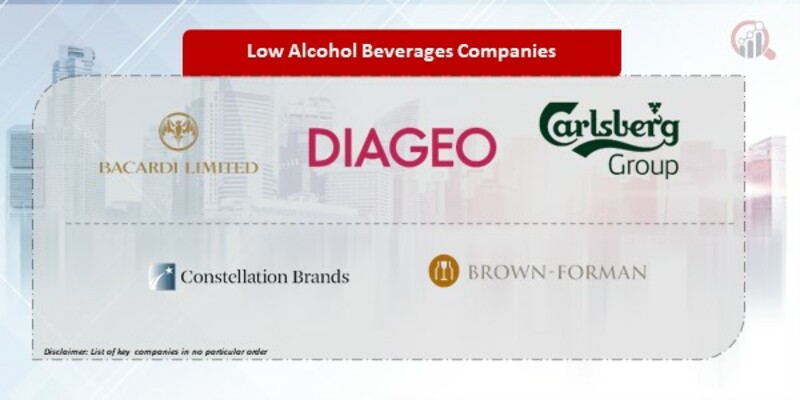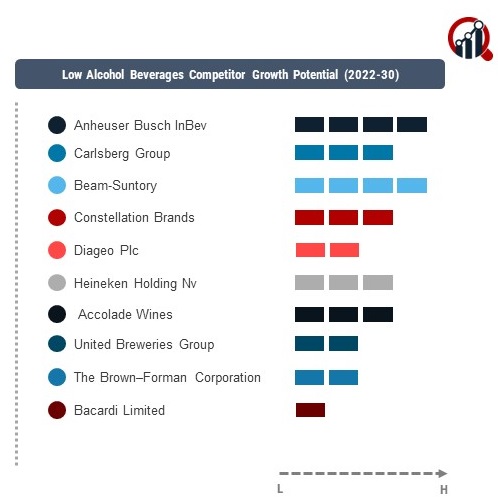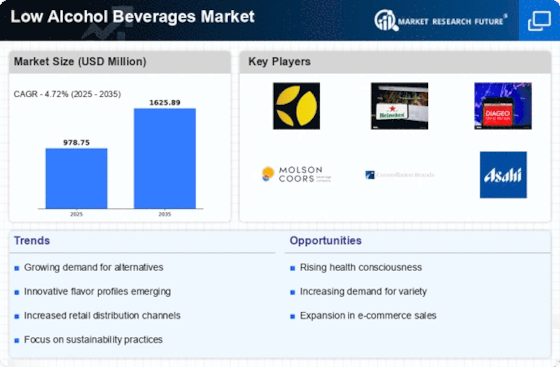Top Industry Leaders in the Low Alcohol Beverages Market

The Low Alcohol Beverages Market has witnessed a significant transformation in recent years, driven by shifting consumer preferences towards healthier lifestyle choices and the growing demand for alternatives to traditional alcoholic beverages. This dynamic market is characterized by a diverse range of products, including low-alcohol beer, wine, spirits, and ready-to-drink (RTD) options. The competitive landscape of this market is shaped by key players adopting innovative strategies to capture market share, navigate regulatory landscapes, and cater to the evolving needs of consumers.
Key Players in the Low Alcohol Beverages Market:
- Bacardi Limited
- United Breweries Group
- Heineken Holding Nv
- Beam- Suntory
- Anheuser Busch InBev.
- The Brown-Forman Corporation
- Accolade Wines
- Carlsberg Group
- Diageo Plc
- Constellation Brands among others
Strategies Adopted by Key Players: One of the primary strategies adopted by major players is product diversification. These companies have expanded their low-alcohol product portfolios to offer a wide range of options, including beers, wines, and spirits with reduced alcohol content. Marketing efforts have also played a crucial role, with an emphasis on highlighting the taste, quality, and health benefits of low-alcohol beverages. Collaborations and partnerships with influencers and wellness advocates have become increasingly common, helping to create a positive image for these products and driving consumer acceptance.
Furthermore, innovation in production processes and ingredients is another key strategy. Companies are investing in research and development to create innovative brewing and distillation methods that preserve flavor while reducing alcohol content. This focus on innovation not only caters to health-conscious consumers but also positions these companies as pioneers in the evolving low-alcohol market.
Factors for Market Share Analysis: Several factors contribute to the analysis of market share in the low-alcohol beverages sector. Brand recognition, product quality, pricing strategies, and distribution networks are pivotal elements. Companies with strong brand equity can leverage their reputation to introduce low-alcohol alternatives successfully. Moreover, ensuring competitive pricing without compromising on product quality is crucial for market penetration. An effective distribution network that reaches diverse consumer demographics also plays a significant role in gaining and maintaining market share.
Consumer sentiment and preferences are dynamic variables that impact market share. Understanding and responding to changing preferences, whether driven by health concerns, lifestyle choices, or cultural shifts, allow companies to stay ahead of the curve. Regular market research and consumer feedback mechanisms are essential for staying attuned to these fluctuations and adapting strategies accordingly.
New and Emerging Companies: The low-alcohol beverages market has witnessed the emergence of several innovative startups aiming to carve a niche for themselves. Seedlip, for example, has gained recognition for its non-alcoholic distilled spirits, targeting consumers seeking sophisticated alternatives to traditional spirits. Ritual Zero Proof is another player making waves with its non-alcoholic whiskey and gin alternatives. These newcomers bring fresh perspectives, often focusing on niche segments within the low-alcohol market and resonating with consumers seeking unique and authentic experiences.
Industry News and Current Trends: Keeping an eye on industry news and current trends is vital for companies operating in the low-alcohol beverages market. Recent trends include the rise of non-alcoholic or low-alcohol RTD options, reflecting the convenience sought by modern consumers. Additionally, the surge in demand for organic and natural ingredients has influenced product formulations, with companies incorporating botanicals and natural flavors to enhance their beverages. Regulatory developments related to alcohol content and marketing also shape the landscape, with companies adapting to comply with evolving standards.
Sustainability is increasingly becoming a focal point for industry players. Companies are exploring eco-friendly packaging options and sustainable sourcing of ingredients to align with the growing consumer consciousness regarding environmental impact. Staying informed about these trends allows companies to proactively adjust their strategies, ensuring they remain relevant and competitive in a rapidly evolving market.
Current Company Investment Trends: Investment trends in the low-alcohol beverages market reflect the industry's growth potential. Venture capital firms and private equity investors are showing increased interest in startups specializing in low-alcohol alternatives. Funding is often directed towards research and development, marketing efforts, and expanding production capabilities to meet the growing demand. Mergers and acquisitions are also prevalent, with larger players acquiring innovative startups to enhance their product portfolios and accelerate market penetration.
Sustainable practices are an attractive investment focus, with companies demonstrating commitment to environmental responsibility receiving favorable attention from investors. The integration of technology in production processes, such as advanced brewing techniques or smart packaging solutions, is another area drawing substantial investment.
Overall Competitive Scenario: In conclusion, the low-alcohol beverages market is a dynamic and competitive space, shaped by the strategic moves of key players, the emergence of innovative startups, and evolving consumer preferences. The ability to diversify product portfolios, innovate in production processes, and effectively market low-alcohol options are crucial for success. Understanding and responding to market trends, investing in sustainable practices, and adapting to regulatory changes are essential elements of a winning strategy. As the market continues to evolve, companies that stay agile, embrace innovation, and prioritize consumer engagement are poised to thrive in the competitive landscape of low-alcohol beverages.
Company News :
Leading the charge in this market are established players who have adapted swiftly to changing consumer preferences. Industry giants such as Heineken, Anheuser-Busch InBev, and Diageo have embraced the low-alcohol trend by introducing a variety of products with reduced alcohol content. Their global presence and extensive distribution networks give them a competitive edge, allowing them to reach a broad consumer base. Additionally, smaller players like Big Drop Brewing Co. and Athletic Brewing Company have gained prominence by focusing exclusively on crafting high-quality, low-alcohol beverages, catering to a niche market seeking sophisticated alternatives.
Anheuser-Busch InBev:
Launched a new line of fruity hard seltzer with lower alcohol content, targeting the popular seltzer trend and health-conscious drinkers.
Partnered with a leading craft brewery to release a low-alcohol IPA (India Pale Ale), expanding their craft beer offerings with mindful options.
Heineken N.V.:
Acquired a non-alcoholic craft beer brand, strengthening their presence in the premium low-alcohol segment.
Launched a new range of flavored sparkling waters with added botanicals, offering refreshing alternatives to sugary beverages












